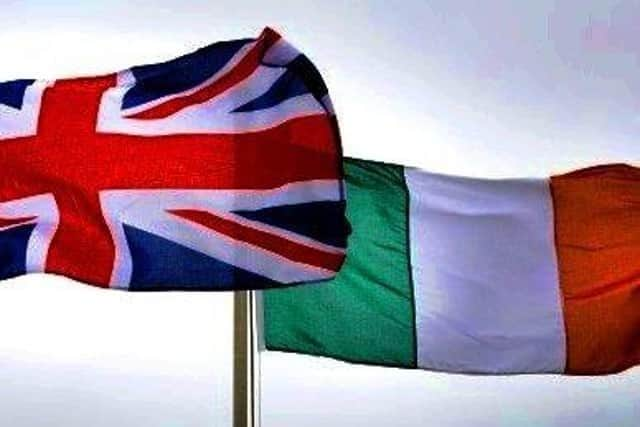Esmond Birnie: The likely scale of subvention under a united Ireland would indeed 'matter'


This is quoted from the BBC News website, ‘The Irish Unity Question and the Economics Behind it’, April 21, 2022).
A prestigious Irish academic journal, produced in association with the Royal Irish Academy, has just published an article which strongly suggests Professor Doyle’s figure would not be correct if unity occurred: the Northern Ireland fiscal deficit which the Dublin government would have to fund would almost certainly be much larger (see https://muse.jhu.edu/pub/423/article/913623/pdf).
Advertisement
Hide AdAdvertisement
Hide AdThe Irish and international academic journal Irish Studies in International Affairs has just published my article about the likely scale of subvention (transfer of government funding) which would be required from the Republic of Ireland to Northern Ireland if there was a united Ireland.
This article is in particular a rebuttal of Professor John Doyle’s argument (also in Irish Studies in International Affairs, 2021) that the subvention would “not matter” if there was a united Ireland.
When Doyle, who is a professor in Dublin, says the “subvention does not matter” what he means is that it does not represent a significant barrier to political unification.
This is partly because it is “…a UK accounting exercise”. In his view it would not equate to the fiscal transfer which might be necessary as part of a united Ireland. Doyle presented arguments to show how it is highly likely that the post-united Ireland transfer would be much smaller than the subvention: £2.4bn rather than £9.4bn.
Advertisement
Hide AdAdvertisement
Hide AdDoyle further claims a united Ireland would very directly lead to such an upsurge in economic performance in both Northern Ireland and the Republic of Ireland that any concerns relating to paying for unity would become “…irrelevant”.
We responded to Doyle’s argument by updating the data through to 2022 (the most up-to-date figures available) and by showing how it developed over the period 2000-22.
We also review Doyle’s method regarding the possible reduction of the subvention if there was unity.
Of course, much would depend on the negotiating positions adopted by the two governments, UK and Irish.
Advertisement
Hide AdAdvertisement
Hide AdWhilst there can be no certainty about these, the former is likely to be very concerned about any precedents established for Scottish independence and this is one very powerful reason why Doyle’s assumptions are questionable about how far the UK government would write off certain public expenditure liabilities relating to Northern Ireland.
Whereas Doyle characterised the subvention as a “…symptom of [this] weakness…”, my article outlines how it has potentially positive effects (sustaining aggregate demand and employment) but also negative impacts (harmful effect on quality of decision making) on a regional economy.
The broader question of the economic and welfare effects of Northern Ireland’s membership of a relatively larger fiscal union (i.e. the UK) as opposed to the impact of being part of a relatively smaller fiscal union (united Ireland) is considered. It may be safer being part of the large union.
The subvention can be considered as one part of Northern Ireland’s long run and often fraught funding relationship with the UK Treasury and government.
Advertisement
Hide AdAdvertisement
Hide AdGiven that experience, and assuming some decentralisation continues to the six Northern counties, it is worth speculating how well a system of fiscal transfers within a united Ireland might operate, i.e. how would the fiscal relationship work (or not work!) between an Irish national government in Dublin and a devolved government at Stormont?
There are strong grounds for believing that only would the difficult relationship between national and regional government which existed during 1921-2023 continue but such relationships would be even more fraught when translated into the context of Irish unity – more fraught because we would now have two layers of government with fairly similar levels of bargaining power.
We assessed Doyle’s claim that a united Ireland would produce an upsurge in economic performance. It is very doubtful, both in terms of scale and time scale, there would be an upsurge on scale sufficient to render the subvention irrelevant.
But, returning to the figures about the likely scale of the required transfer, Doyle estimated a deficit/subvention of £2.4bn in 2018-19. Given more up to date data, we think it more likely to have been in the range £3.6bn to £8.8bn.
Advertisement
Hide AdAdvertisement
Hide AdIn 2021-22 replication of Doyle’s method implied a deficit/subvention of £6.8bn but when some of his assumptions are relaxed that increases to £12.6bn.
There are at least three key reasons why Doyle (and others) have tended to underestimate the likely scale of a transfer following unity.
First, they are using out of date figures which have since been revised upwards. Second, Covid and the war in the Ukraine have ratcheted public spending upwards and are likely to imply that on a longer term basis the subvention is larger than it would have been. Third, some of Doyle’s assumptions are questionable.
Given the likely figures relating to the scale of the subvention it is highly likely that the subvention continues to matter.
Advertisement
Hide AdAdvertisement
Hide AdA similar point has been made by the Dublin economist Professor John FitzGerald in the Irish Times (‘Fiscal implications for a united Ireland are stark’, December 1, 2023).
The long run performance of the Northern Ireland economy suggests little grounds for believing that unification per se would produce a direct upsurge in economic growth which would render such a deficit irrelevant.
Dr Esmond Birnie is senior economist at Ulster University